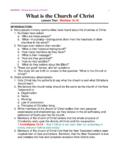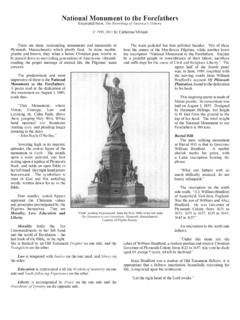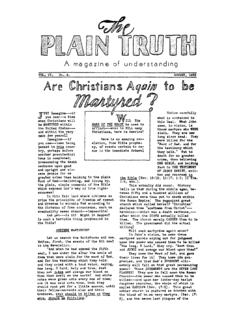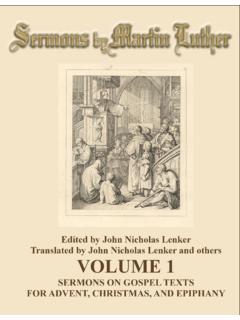Transcription of FAITH SEEKING UNDERSTANDING Our Christian …
1 Our Christian UNDERSTANDING of God by Revd Richard Cater Page 1 FAITH SEEKING UNDERSTANDING Our Christian UNDERSTANDING of God Chinese Speaking Congregation s Study Day With Revd Richard Carter Contents: Introduction: Talking About God Sources of Theology 1. Revelation 2. Experience 3. Scripture 4. Tradition 5. Culture and Context 6. Reason Introduction: Talking About God: Theology The word theology has origins in the Greek language: Theo meaning God logy comes from words Words about God or God-talk The theologian (theologos) in Classical Greece was one who treats or considers the Gods.
2 A more specific definition is put forward by John Macquarrie in Principles of Christian Theology. Theology may be defined as the study which through 1) Participation and 2) Reflection upon a religious FAITH , seeks to express the content of this FAITH in the 3) Clearest and most coherent language available. 1) Participation i) Participation in the FAITH We are not simply observers. We are not content simply to describe religion or examine it from the outside in. We come from a position of belief, and we try to understand more clearly what we believe and to establish what that belief means for us. We are not describing water, we are swimming in it.
3 Ii) Participation in the Community of the Faithful Our Christian UNDERSTANDING of God by Revd Richard Cater Page 2 We are not a private individuals, simply putting forward our own views, opinions or investigations. We belong to community- a member of that community worshipping and believing with it. We are part of the body of Christ. Moses: pilgrimage, a search for greater UNDERSTANDING and relationship. The Prophets: speaking out about the nature of that relationship. The disciples who followed Jesus had to participate- they followed him, they witnessed, asked questions, got involved. They followed long before they understood!
4 Similarly at St Martin-in-the-Fields we are not observers or onlookers giving objective descriptions. We are not simply private individuals trying to satisfy our own needs. We are involved in it, we are part of the community of the faithful, we are those who have chosen to join together with one another. The marriage has taken place, now we are SEEKING to discover the nature of that relationship. It is NOT ALWAYS EASY! 2) Reflection While we are participating members of the community of the faithful, we are also called to take a step backwards from the immediate experience of FAITH . The Storm on the Lake (Matt 13: 14)-----They (the disciples) have FAITH but they have not yet reflected or grasped the implications of that FAITH , they see but do not perceive or understand.
5 -St Peter beginning to reflect on his FAITH . -St Thomas- My Lord and my God =an immediate expression of FAITH , but it was only much later that the full theological implications of that statement were to be realised. We are called to reflect deeply about our religion and understand its meaning within the lives of the community (John 13: 7). Jesus says to Peter You do not know what I am doing but later you will understand. 3) Clearest and Most Coherent Language Available The importance of language, to explain, to share our experiences, to persuade, to witness, to reflect. Our aim to express our UNDERSTANDING of God in the clearest most understandable way.
6 We use language to express our UNDERSTANDING of God. We use language to talk about God, but the more we grow in our FAITH , the more language we need to express what we mean. God is Love -----Using language symbolically Sits at the Right Hand of the Father Lamb of God who takes away the sins of the world . Heaven and Hell. Son of God, The Light of the World. We wish to use language which is rational and people can understand. But at the same time we do not wish to limit him or mislead people through the language we use. Council of Nicea 325- language of the Creed. Our Christian UNDERSTANDING of God by Revd Richard Cater Page 3 But not just language also sign, symbol, action, sacrament to express our understading.
7 If we look at those three elements, we begin to see more clearly: 1) Coming and being in a community of FAITH 2) Reflecting on that FAITH 3) SEEKING to put it into words, to express it in the clearest possible language. St Paul, St Peter, the Gospel writers, the Early Church Fathers, we as Christians in the 21st century at St Martin-in-the Fields. Definitions of Theology 1) FAITH SEEKING UNDERSTANDING 2) FAITH Struggles for the Clarity of its Cause Both of these speak of SEEKING questioning FAITH . Not blind FAITH - again and again Christ presents FAITH as walking in the light. There is a responsibility of the Christian community to inquire about its FAITH in God.
8 Daniel Migliore The work of theology is a continuing search for the fullness of the truth of God made known in Jesus Christ. Theology is not mere repetition of traditional doctrines but a continuous search for the truth to which they point and which they only partially and brokenly express. We explore, we discover, we witness, we experience. Our growth as Christians is not indoctrination it is about asking questions and being questioned. Living the questions FAITH Raising Questions Anselm described theology as fides quaerens intellectum ( FAITH SEEKING UNDERSTANDING ). It is FAITH asking and raising questions in order to understand.
9 If Christian FAITH is basically trust in and obedience to the freely gracious God made known in Jesus Christ, theology is FAITH asking questions and struggling to find answers to those questions. When you come to church you should not seek to be handed a briefcase full of ready made in SEEKING God you become explorers, those who embark upon a pilgrimage and journey of discovery. It will be the most exciting journey of your life. This journey will last the whole of your keeps on SEEKING and asking. Mystery and Doubt Let us proclaim the mystery of our FAITH : Christ has died Christ is risen Christ will come again.
10 Our Christian UNDERSTANDING of God by Revd Richard Cater Page 4 Gabriel Marcel A mystery is not a problem. While a problem can be solved, a mystery is inexhaustible. A problem can be held at arm s length; a mystery encompasses us and will not let us keep a safe distance. Christian FAITH points to inquiry not least because it points to the shocking mystery of humble service and terrible passion of Jesus. It is hard to understand. There will be doubt. FAITH only sees dimly, not face to face and many questions of FAITH still remain. The Gospel has to be relevant, if it is the Gospel, to the world of work, leisure, money, commerce, because the Lord risen from the dead is the Lord of the whole of life, not just a part of it.






